
We speak with the secretary general of Amnesty International about the human rights group’s new report on the “global political economy enabling Israel’s genocide, occupation and apartheid” against Palestinians. Agnès Callamard says Israel’s “24 months of genocide” since October 2023 would not be possible without international support and the continued supplying of Israel’s war machine by major arms makers, technology firms and other companies. The report names the U.S. military contractors Boeing and Lockheed Martin, the Israeli arms companies Elbit Systems, Rafael Advanced Defense Systems and Israel Aerospace Industries, the South Korean conglomerate Hyundai and the U.S. tech company Palantir Technologies, among others. While Israel faces growing international condemnation over its actions in Gaza, Callamard says other states must push for an immediate ceasefire and impose consequences, including an arms embargo on Israel.
“You can denounce as much as you want. If you do not take actions, including economic actions, then your words are empty,” says Callamard.
Transcript
NERMEEN SHAIKH: The Israeli military is escalating its attack on Gaza City in an effort to erase the city and forcibly remove the city’s entire population. Over the past 24 hours, Israel killed at least 79 Palestinians, but the toll could be far higher. Much of Gaza has been in a communications blackout since Wednesday.
This comes as the heads of more than 20 aid groups have called on world leaders to urgently intervene in Gaza, after a U.N. commission concluded for the first time that Israel is committing genocide. The aid groups wrote, quote, “We are on the precipice of an even deadlier period in Gaza’s story if action is not taken. Gaza has been deliberately made uninhabitable,” they wrote.
Meanwhile, Amnesty International has just released a major report on the states, public institutions and companies that have enabled and profited from Israel’s genocide and occupation. Companies named in the report include U.S. military contractors Boeing and Lockheed Martin, the Israeli arms companies Elbit Systems, Rafael Advanced Defense Systems and Israel Aerospace Industries, the South Korean conglomerate Hyundai and the U.S. tech company Palantir Technologies.
AMY GOODMAN: The Amnesty report is headlined “Pull the Plug on the Political Economy Enabling Israel’s Crimes.” To talk about the report and much more, we’re joined here in our New York studio by Agnès Callamard, Amnesty International secretary general.
Thank you so much for joining us. What we are seeing in Gaza right now: Israeli troops moving deeper into Gaza City as Israel continues its full-fledged military ground invasion; the Israeli Defense Minister saying, “Gaza is burning”; international condemnation; hundreds of thousands of people have been forced to flee the city. What is Amnesty International calling for right now, Agnès?
AGNÈS CALLAMARD: Well, immediately, a ceasefire. What we need is to end the suffering. So, anything that can allow for the Palestinians some respite, the mother to be able to feed their kids, the wounded to be taken care of, that must be the priority. It’s not a priority for Amnesty. It must be a priority for all those states coming to New York. It must be the priority for anyone in this world with a little bit of conscience, with still a little bit of love for humanity. Please, that must stop.
NERMEEN SHAIKH: So, Agnès, if you could — I mean, the report —
AGNÈS CALLAMARD: But that’s — that’s the immediate demand.
NERMEEN SHAIKH: Of course, and we’ll get into the other demands that you list specifically in this report. I mean, we gave an outline of the companies that you’ve named. In particular, let’s talk about the U.S. military companies. You talk about Boeing and Lockheed Martin, in particular, which is, as the report says, the, quote, “backbone of the Israeli Air Force which has been used extensively during the bombardment of the occupied Gaza Strip.” So, if you could talk about the number of companies, military companies in particular, which are, of course, the most immediately destructive, the companies who are involved, and what responses you’ve received from any of them?
AGNÈS CALLAMARD: OK. So, I think the first message must be very clear. Fifty, more than, you know, years of unlawful occupation, decades of apartheid, 24 months of genocide, that cannot happen in a vacuum. That cannot happen without the support of many actors, hundreds of actors, thousands of actors, powerful actors, that are sustaining an economy grounded, based on international crimes.
When it comes to the genocide, we all know that Israel’s, you know, bombing, eradication of Gaza, has been made possible through weapons manufactured outside Israel, against international law, by the way, including the Genocide Convention. We, in that — in the report that you are mentioning, are naming two of those companies. I want to be very clear. They are illustrative of a global trend. They are illustrative of a global political economy of oppression and of killings. Those two companies are Boeing and are Lockheed Martin. We are also naming three Israeli companies that are at the heart of Israel’s military operations. We are naming them because we have the evidence of their contribution to, of their link to the genocide. Others have named other companies. I want to be very clear, we’re just part of a global movement that want to denounce all of this economic complicity that are sustaining the worst possible crimes.
NERMEEN SHAIKH: Well, I mean, of the companies that you’ve named, what’s striking in the report — there are many things, but there are very few that have responded to the report —
AGNÈS CALLAMARD: Very few, yeah.
NERMEEN SHAIKH: — despite the fact that Amnesty is, of course, the biggest human rights organization in the world. One of the Israeli companies —
AGNÈS CALLAMARD: Yeah.
NERMEEN SHAIKH: — Elbit Systems, responded, one of the few to respond, said that their sales to the government, the Israeli government, were, quote — they were lawfully selling, because Israel is “a sovereign, unsanctioned government, recognized by the international community,” and that there is, quote, “no legal basis for restricting our sales.” Is there any response —
AGNÈS CALLAMARD: That’s wrong, by the way. But yeah.
NERMEEN SHAIKH: Correct. But is there any company, any response that you’ve received, where they have said that they will at least minimally investigate?
AGNÈS CALLAMARD: If they are named, no. There are companies that may have been withdrawn from our original list, OK? But if — the 15 companies that are named have taken no actions and have committed to no actions that we believe will allow for them not to contribute, profit, link — or to be linked to any of those crimes.
Just to highlight again the fact that under international law, there are at least, you know, a large number of provisions which demonstrate that those companies are violating the laws, and the state that allows those companies to do so are also violating the law. The Genocide Convention and the obligation to prevent genocide means an obligation not to sell weapon to a state that is likely to commit genocide. There are arms treaty, Arms Trade Treaty, that prohibit the sale of weapons when those weapons are known to be used to commit international crimes. There is the Apartheid Convention. There is the international occupation law. We have — in fact, we are celebrating the one-year anniversary, sadly, of a General Assembly resolution last year which demanded that all governments cease to support Israel unlawful occupation. And what does that mean? It means that everyone is duty-bound not to recognize the unlawful occupation, and that not — the duty of nonrecognition entails the duty of no trade, the duty of no economic relations, the duty of no political relations that are in relation to the occupation.
So, on many grounds, a range of companies are implicated in sustaining in prolonged international crimes. The reason why we have issued this report, too, is that we need to understand this is not a two-years, this is not just a one-year problem. We are talking about decades of unlawful occupation, decades of apartheid, and now 24 months of genocide.
AMY GOODMAN: I wanted to go to Netanyahu, clearly feeling the pressure, who announced on Tuesday Israel will create an independent arms industry that can withstand international constraints, he said.
AGNÈS CALLAMARD: Yeah.
PRIME MINISTER BENJAMIN NETANYAHU: So we are going to produce an independent arms industry, very powerful, very strong, that can withstand any kind of international political constraints and will provide security for the state of Israel. This is what I envision for the state. It’s going to continue to grow, it’s going to continue to innovate, and it’s going to continue to provide for our security and our prosperity.
AMY GOODMAN: So, if you can respond to what Prime Minister Netanyahu said, and talk more both about the level of support that the Israeli arms industry, in particular, gets from the United States, and how the arms manufacturers here are, some might say, making a killing —
AGNÈS CALLAMARD: Yeah.
AMY GOODMAN: — and also what this means to shore up the Israeli arms industry, even beyond the companies that you’ve named — Elbit, Rafael Advanced Defense Systems, Israel Aerospace Industries?
AGNÈS CALLAMARD: So, the statement from Netanyahu indicates, one, that he has in mind an economy of war, that’s what he wants to build, and, two, that he wants to build a society predicated on war and on weapons and on everything that is linked to that. So I leave that to the Israeli people to think that through a bit more.
Look, an autarchy, you know, system, it’s just silly. It’s a political statement. It won’t make those Israeli companies legal, their actions lawful, whether or not they are just doing that for the Israeli government or whether they are exporting abroad. It is very clear that the production of weapons that is meant for the commission of international crimes is a crime in itself and by itself.
The export of those weapons — those three companies that we are naming are, you know, big exporters. You know, I was at the NATO summit a couple of months ago. I mean, the fact that — we need to understand that, for decades, our defense, our Western defense community, the surveillance community, the IT community, has been completely embedded with the Israeli companies. It was very clear at the NATO summit.
So, those companies are major actors globally. We, therefore, have the tools. And that’s where Netanyahu got afraid, because we do have the tools, not only not to export to Israel, which we must do, but we have also the tool to sanction those companies, Israeli companies. This is what we call for. We demand that state and other companies stop purchasing from Elbit and the others. We demand that they divest from those companies. We demand that they are barred from attending anything related to our market. That’s because the power of sanction is indeed very, very important. And we, the people — we, the people, must make sure that our governments deliver on their obligations.
NERMEEN SHAIKH: Well, I mean, there’s also the question, which you highlight in the report, of the political — extraordinary political support that has enabled this —
AGNÈS CALLAMARD: Yeah.
NERMEEN SHAIKH: — as you say, genocide to continue for now almost two years. You’re here for the 80th session of the U.N. General Assembly. Now, Netanyahu announced earlier this week that he’s coming again to the White House, for the fourth time, as the U.S. simultaneously, earlier this month, announced that they’re suspending visas for Palestinian passport holders, including the Palestinian officials who were expected to attend the U.N.General Assembly session.
AGNÈS CALLAMARD: So, first and foremost, let’s highlight the fact that the United States is holding all of us hostage, of the fact that the General Assembly is taking place in New York. And that, frankly, should be unacceptable to the U.N. and to all member states of the U.N. The U.S. political support to Israel for many years, but particularly for the last 24 months, is what has sustained the genocide. There are other support. Germany is one of them. The EU, as an institution, until very recently — that is, last week or two weeks ago — has failed to take action against Israel. The political support has been there all along.
Let’s not, however, suggest that behind the good denunciation of some governments, including in the Arab world, there were actions. No, there were no actions. And this is what we are insisting upon. You know, you can denounce as much as you want. If you do not take actions, including economic actions, then your words are empty.
AMY GOODMAN: Agnès Callamard, you are here in New York for this 80th session of the U.N. General Assembly. The theme is “Better together: 80 years and more for peace, development and human rights,” this at the same time that the world is watching this live-streamed assault on an entire population in Gaza, the brutal footage on their phones every day — might think the U.N. is totally useless. What are your thoughts on this, and your recommendations for reform of the U.N.? You even mentioned people are talking about moving the U.N. out. If they’re going to impose who can come to the U.N., the countries they like, and who cannot come, why should it even be in New York? But the rules themselves?
AGNÈS CALLAMARD: Yeah. Look, Amnesty has made a number of recommendations regarding the multilateral system, and the U.N. in particular. We need to insist that the U.N. is a word that describes many things — political bodies, operational bodies. We know that U.N. agencies are doing a great deal of important work in Gaza or in Ukraine or in Sudan, and that’s what we must sustain. The political system of multilateralism, that we need to protect and we need to transform, that begins with the Security Council.
Amnesty International supports the notion of an extended participation to the Security Council. But we are insisting that the veto must be addressed. The right of the veto must be addressed. It is paralyzed at the moment. It is unable to deliver what should have been expected in the case of Gaza, because of the veto power, as it is unable to deliver on other crises, such as in Ukraine. So, the political bodies that are at the heart of what was created in 1948, including the Security Council, are unable to perform their role. Why? Because the member states are making it so, because they intend on destroying what is left of the multilateral system.
So, what I am hoping for is that, you know, we need to continue, because we are there. We have the majority of states in the world that want to protect the multilateral system. You have one state in particular, the United States, that is doing everything in their power to destroy it, because it is not serving the U.S. interest. But time and time again over the last two years, the international community has said, “We need a multilateral system. We need laws that bind us together. We need rules.”
Extraordinarily, the Hague Group, that has been formed, you know, to put pressure on the international community’s action on Gaza — the Hague Group has also demanded that the International Criminal Court be protected. And there are governments in this Hague Group that are no friends of the International Criminal Court, by the way. So, everyone is suddenly realizing, “Wait a minute, we are going to destroy something that at least has protected us from the worst.”
This is what has been happening for the last two years. This is a litmus test for humanity. This is why we’re saying, “Please, humanity must win.” And that also includes protecting a little bit of what has been there for the last 80 years, and transforming what is not working. International financial institutions need an in-depth reform, which were actually put forward and adopted a year ago during the General Assembly with the Contract for the Future.
NERMEEN SHAIKH: Well, I mean, you know, Amnesty is just one of — you mentioned this international — the multilateral system, the international legal framework, under which this genocide is occurring. There have been so many reports, findings, decisions, concluding that a genocide is occurring in Gaza —
AGNÈS CALLAMARD: Yeah.
NERMEEN SHAIKH: — by many of precisely these institutions, including, most recently, this U.N. inquiry, also judicial bodies, the International Court of Justice, the ICC; human rights organizations, Amnesty, which became the first in December; academic organizations, the International Association of Genocide Scholars; humanitarian organizations; medical organizations, Médecins Sans Frontières. Now, we speak to people in Gaza regularly. It’s absolutely beyond reason that none of these statements, which they mention — all of these decisions come out. Organizations, very powerful ones, make statements. And yet, it’s going to be — next month, it’s going to be two years that this has been happening.
And as you mentioned, these international organizations were born in the wake of the worst genocide in history, or at least in modern history, and they were, you know, responsible for ensuring nothing like this would happen again. Now, of course, it did, in Rwanda and Srebrenica and in Cambodia. But in this case, as against all those others, the most powerful countries, who were responsible —
AGNÈS CALLAMARD: Yeah.
NERMEEN SHAIKH: — for setting up these institutions, are actually backing this genocide, on top of which, as the Irish lawyer who was advising the South African government at the International Court of Justice — as she said, this is the first live-streamed genocide.
AGNÈS CALLAMARD: That’s true, yeah.
NERMEEN SHAIKH: So, you know, if you could comment on that? What is, in fact, the utility of people making these statements —
AGNÈS CALLAMARD: Yeah.
NERMEEN SHAIKH: — beyond symbolic or rhetorical? And second, what is Resolution 377 at the United Nations? And why has it not been invoked in this case? The one — the “Uniting for Peace” resolution that enables the General Assembly to make a decision when the Security Council is deadlocked —
AGNÈS CALLAMARD: Yeah, no, it has been — mm-hmm, yeah.
NERMEEN SHAIKH: — which would, in fact, go so far as to necessitate, call for peacekeeping forces in a situation precisely like this one.
AGNÈS CALLAMARD: First question, NGOs don’t stop genocide. Doctors don’t stop genocide. Human rights investigators don’t stop genocide. States stop genocide. Companies can stop genocide. The international civil society, for the last 24 months, I think, has played its role, the last one being the Commission of Inquiry. The people of Gaza, the Palestinians’ human rights organizations, have played their role. They denounce, we denounce, investigate, report. But we cannot stop the genocide. It’s not — it’s not something that we can — you know, it’s not something that we can do. What we can do is highlight the complicity, is highlight the fact that states are failing to do what they should do under international law. And that, too, we have done.
But when you are — I think what Gaza is showing us is that when the most powerful state — that is, the United States — and many states in Europe are prepared to completely vandalize their own commitment and what they championed 80 years ago, when Russia could not care less, because they want to do whatever they want to do in Ukraine, and when China is thinking, “Oh, this is probably nothing good for me, nothing to gain from it. I won’t” — then it goes on. It goes on, and it goes on. And the 80, 90% of the global community that has repeatedly demanded ceasefire, an end to the genocide, we are the global majority. We, not in a racial term, not in a ethnic term — we are the global majority. We have demanded an end to the genocide — states, the majority of states. And yet nothing is happening, because the most powerful state, becoming — starting with the United States, is making it impossible.
And that resolution that you are mentioning has been used. The problem with the GA resolutions is that they are not binding. But, yes, it is remarkable that the General Assembly has, on two or three occasions over the last two years, taken upon its own, you know, has grown into saying, “Well, if the Security Council is paralyzed, we won’t be paralyzed.” And this is when you will realize that it is largely, 90% — you know, at the last resolution a week ago, it was on the two-state solution. We had a handful of states voting against it.
We are the global majority demanding an end to the genocide. So why isn’t it happening? Well, it is not happening because that global majority made up of states is not acting. They know they should do, but are they prepared to do the right thing? Are they prepared to divest from Israelis’ company? Are they prepared to sanction those that are feeding the genocide? You know, if 80% of the global community was actually acting on their words, I think the genocide will have stopped. So, yes, we are confronting a very powerful enemy of humanity. But sadly, we have not been helped by the fear, by the cowardice, by whatever it is that is currently animating most governments in the Arab world, in Asia and in Africa. They are not rising to the challenge in terms of actions.
NERMEEN SHAIKH: Well, Agnès, just, you know, last, you mentioned many European states who are backing Israel.
AGNÈS CALLAMARD: Yeah.
NERMEEN SHAIKH: The EU is the largest trading partner of Israel.
AGNÈS CALLAMARD: Absolutely.
NERMEEN SHAIKH: What would it mean — it’s highly unlikely — if this plan to limit trade with Israel were to actually go through, what the EU announced?
AGNÈS CALLAMARD: I think it may. It may go through, actually. It will have — that’s why Netanyahu is talking about creating, you know, an economy, a self-reliant economy. It will have an impact. This is why Amnesty International and others have spent the last 24 months lobbying at the European Union. That has been an absolute shameful 24 months. The president of the EU has made a mockery of any principle upon which the European has been — the European project has been built. It is not just a market project. It is not just an economic project. It is a value-based project. And she has spitted on it for the last 24 months.
So, we are continuing to demand that the EU act on its founding text, act on its principles. And there are states in Europe — I have mentioned, of course, Germany, Hungary as supporting Israel. But let’s not forget the role played by Ireland, the role played by Spain, the role played by Belgium. I mean, here, at least, we have some European states that have spoken loudly and that have acted according to their words.
AMY GOODMAN: Agnès Callamard, we have to go, but we are going to do a post-show with you, put it online at democracynow.org, to talk about Ukraine, to talk about Sudan, to talk about Afghanistan and more. Agnès Callamard is the secretary general of Amnesty International.
Coming up, The Disappearance of Dr. Abu Safiya. Stay with us.
[break]
AMY GOODMAN: “Fenfo,” “Something to Say,” by the Malian singer Fatoumata Diawara, performing in our Democracy Now! studio.

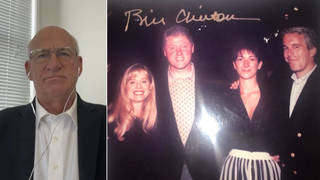
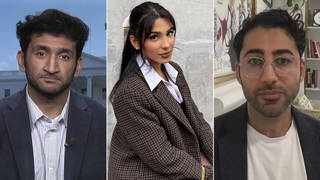
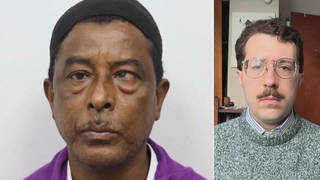






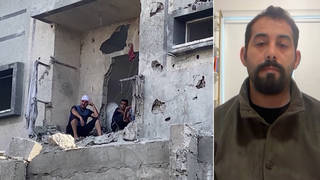
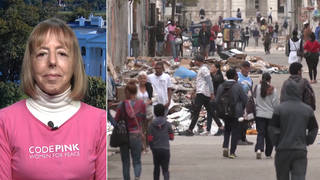
Media Options